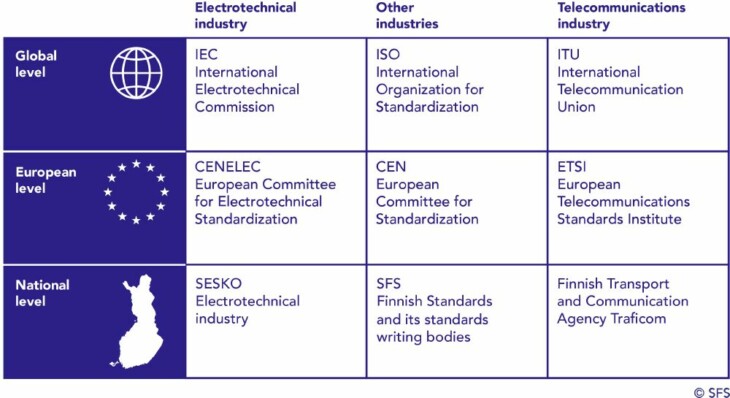Standardization in Finland and globally
Standardization in Finland is closely connected to international work. Most standards are international and therefore effective global tools.

Standardization in Finland
In Finland, SFS serves as the National Standards Body (NSB). Standardization work is carried out in standardization groups comprising of SFS and various organisations representing their respective industries, i.e. standards writing bodies.
The standardization groups follow European and global standardization, comment on draft standards and participate in their development. 97 per cent of the standards approved in Finland are of international origin. International standards are sometimes complemented by nationally developed standards, but some national standards are exclusive for Finnish use. A national standard may eventually become an international standard if there is a need for it in the European or global market. 97% of standards approved in Finland are of an international origin.
Standardization follows very precise processes. The responsible person is an expert of standardization appointed by a standards writing body. He or she will usually act as the secretary of the group. Standardization groups have experts in the field in question, representing companies and other organisations. Depending on the group, it may have a membership fee or participation may be free.
European standardization
SFS is a member of CEN, the European Committee for Standardization, and ISO, the International Organization for Standardization.
Founded in 1961, the European Committee for Standardization CEN is an association that brings together the national standardization bodies of all EU and EFTA countries. The same European standards are valid in all CEN member states, which are obligated to nationally approve European standards and to withdraw any conflicting standards. Standards approved by CEN have the designation “EN”. About 30 per cent of them are based on global ISO standards.
CEN has over 300 technical committees, i.e. European Standardization Groups. The corresponding Finnish standardization groups participate in their work. All members have the right to participate in technical committees, while secretarial work of each committee has been designated to a member organisation. Managing a secretariat gives an opportunity to observe the development of standards closely and, in particular, to influence the contents of future standards.
The Committee for Electrotechnical Standardization CENELEC manages the development of European electrotechnical standards. Its members comprise of all EU and EFTA countries and various Eastern European countries. 75 per cent of CENELEC standards are based on global IEC standards. In Finland, the organisation responsible for electrotechnical standardization is SESKO.
The European Telecommunications Standards Institute ETSI develops international telecommunications standards. Its members include governing bodies in the field of information technology, producers of telecommunications and network services as well as telecommunications businesses. In Finland, the organisation responsible for telecommunications standardization is Traficom.
CEN, CENELEC and ETSI develop standards also at the request of the European Commission. These harmonised standards provide more detailed instructions on how to comply with specific directives.
Global standardization
Founded in 1947, the International Organization for Standardization ISO is the largest standardization organisation in the world. Its members include national standardization organisations from over 160 countries.
ISO oversees the standardization work taking place in its Technical Committees. The total number of international Technical Committees is currently around 250. All member bodies have the right to appoint participants to the committees. In regard to Finland, members of national standardization groups can participate. Secretarial responsibilities of subcommittees under each technical committee or the role of the Committee Manager of a technical committee have been entrusted to one of the member bodies.
National adoption of ISO standards in Finland is not mandatory. In Europe, CEN approves some of the ISO standards as EN standards, in which case they must be implemented by all CEN member countries as EN ISO standards. In Finland, they thus become SFS-EN ISO standards.
For ISO, the most important partner in standardization is the International Electrotechnical Commission IEC. ISO and IEC have joint technical committees, and standardization of information technology, for example, is a collaborative effort. Founded in 1906, IEC can be considered the first international standardization organisation; electrotechnology was the first industry where the need for common terminology was recognised.
The International Telecommunication Union ITU is a special organisation of the United Nations. The goal of telecommunications standardization is the compatibility of communications networks, terminal devices and communications services.

CEN/TC 343 Solid recovered fuels
Palta holds the secretariat of the CEN Technical Committee 343, Solid Recovered Fuels. Founded on the initiative of Finland and operating under a mandate given by the European Union, the committee first developed technical specifications on solid recovered fuels. Subsequently, some of these technical specifications have evolved into EN standards. If you wish to participate in standardization in this field, please contact Service Sector Employers Palta. The Chair of the committee is Mika Horttanainen, and the Committee Manager is Suvi Pasanen.
ISO/TC 300 Solid recovered fuels
Finland also holds the secretariat of the international Technical Committee ISO/TC 300, Solid recovered fuels. This committee prepares standards covering the whole lifecycle from product acceptance to distribution. The secretariat of the committee is held by The Service Sector Employers Palta. The Chair of the committee is Mika Horttanainen, and the Committee Manager is Suvi Pasanen.
CEN/TC 383 Sustainably produced biomass for energy applications
The secretariat of the CEN standardization committee focusing on biomass sustainability criteria is managed by Kemesta. The committee develops standards related to sustainable biomass production criteria that can be applied to the implementation of the Renewable Energy Directive (RED). The standards must cover the full product life cycle, and they must include the relevant terminology, social, financial and environmental principles, criteria and indicators, and calculations for greenhouse gas emissions. If you would like to participate in standardization within this field, please contact Kemesta. The Chair of the committee is Olli Mäki, and the Committee Manager is Minna Annala.
CEN/TC 147 Cranes – Safety
The scope of the Committee CEN/TC 147 Cranes – Safety covers the European and international crane standards. The committee develops standards for the safe design, testing and operation of cranes. In addition, the standards cover different attachments to cranes and markings. The new EU Regulation 2023/1230 on machinery requires that almost all standards harmonised in accordance with the preceding Machinery Directive 2006/42/EC be revised. If you are interested in taking part in standardization in this area, please contact METSTA (Mechanical Engineering and Metals Industry Standardization in Finland). The Chair of Committee CEN/TC 147 is Hannu Lindfors, and the Committee Manager is Frans Nilsén.
ISO/TC 23/SC 15 Machinery for Forestry
The scope of the Committee ISO/TC 23/SC 15 Machinery for Forestry covers all standardization of machinery for forestry, including terminology, safety, test methods and ergonomics. The Chair of the Committee is Jukka Malinen, and the Committee Manager is Ville Saloranta. If you are interested in taking part in standardization in this area, please contact METSTA (Mechanical Engineering and Metals Industry Standardization in Finland).